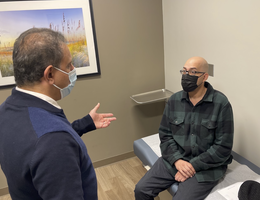We’re Stronger Together
With your help, we can make ambitious innovations in clinical care and education for our community.
Our neurosurgeons are committed to finding a cure for epilepsy. Through research and leading-edge technology, we offer surgical options for even the most complex patients.
Both adults and children can have successful epilepsy treatment. Experts at our comprehensive Level 4 Epilepsy Center and Children’s Hospital (for pediatric epilepsy care), develop personalized treatment plans so you can live the fullest life possible.

Our team is focused on the treatment of epilepsy, one of the most common conditions affecting the brain. It is a nervous system disorder affecting the brain, causing seizures or uncontrolled electrical activity between brain cells. Seizures come in many forms and levels of severity, including:
Approximately 30% of people with epilepsy can’t control their dangerous seizures with
medication (refractory epilepsy).


“We can help people looking for an opportunity to cure their epilepsy. Patients’ lives are transformed — they can drive again, they can work.”
Yes. If you have tried and failed to manage your epilepsy with medications, ask your neurologist for a referral to the Loma Linda Comprehensive Epilepsy Center or call us at 909-558-2880.
An accurate diagnosis will determine your surgical treatment options. In collaboration with your neurologist, we may recommend imaging studies, including MRI, SPECT, PET scans or observation in our Epilepsy Monitoring Unit. The imaging studies will help pinpoint the location of abnormal brain activity.
Some patients need further assessment using electrodes placed inside the skull to record activity. We use the most advanced technology, stereoelectroencephalography (SEEG), to pinpoint the exact location of seizure activity. SEEG is a minimally invasive procedure that allows us to access precise areas of your brain using very small incisions. This robotic-assisted procedure uses high resolution imaging to map the brain, locate the seizure zone and guide our surgeons on where to implant the electrodes.
Before your stay at our EMU, our patient navigator will contact you and schedule your admission. You may be directed to change your medications before your hospitalization to help analyze your seizures.
You will report directly to the EMU on your scheduled day. Your length of stay will depend on your seizure activity. Our team will work with your neurologist to trigger seizures during your stay. You are closely monitored to ensure you remain safe.
You can expect:
During observation, we learn what is happening to your brain before, during and after seizures. We track your seizures using video and electroencephalogram (EEG) monitoring equipment.
Our surgeons are on the leading edge of research and offer pioneering treatments and surgical techniques. We are at the forefront of epilepsy treatment in the region and across the United States.
The purpose of surgery is to permanently disrupt and stop the abnormal electrical activity in the brain that causes the seizures. Surgery may remove a lesion on the brain or a section of the brain. Other surgeries include using lasers or radiation to eliminate an area where the seizure originates or implanting a device that uses electrical signals to stop seizures.
If surgery will benefit you, our team will come together to provide the most advanced treatment options that are right for you. Specialists including epilepsy neurologists, epilepsy neurosurgeons, neuropsychologists, neuroradiologists and our epilepsy coordinator will create a plan focused on improving your quality of life and potentially curing your seizures.
To learn more about how to get a referral to our neurosurgeons, call 909-558-6388.
Our team can also help you understand your health insurance coverage and work with your insurance company to get the approvals you need prior to treatment.





“We can help people looking for an opportunity to cure their epilepsy. Patients’ lives are transformed — they can drive again, they can work.”
Yes. If you have tried and failed to manage your epilepsy with medications, ask your neurologist for a referral to the Loma Linda Comprehensive Epilepsy Center or call us at 909-558-2880.
An accurate diagnosis will determine your surgical treatment options. In collaboration with your neurologist, we may recommend imaging studies, including MRI, SPECT, PET scans or observation in our Epilepsy Monitoring Unit. The imaging studies will help pinpoint the location of abnormal brain activity.
Some patients need further assessment using electrodes placed inside the skull to record activity. We use the most advanced technology, stereoelectroencephalography (SEEG), to pinpoint the exact location of seizure activity. SEEG is a minimally invasive procedure that allows us to access precise areas of your brain using very small incisions. This robotic-assisted procedure uses high resolution imaging to map the brain, locate the seizure zone and guide our surgeons on where to implant the electrodes.
Before your stay at our EMU, our patient navigator will contact you and schedule your admission. You may be directed to change your medications before your hospitalization to help analyze your seizures.
You will report directly to the EMU on your scheduled day. Your length of stay will depend on your seizure activity. Our team will work with your neurologist to trigger seizures during your stay. You are closely monitored to ensure you remain safe.
You can expect:
During observation, we learn what is happening to your brain before, during and after seizures. We track your seizures using video and electroencephalogram (EEG) monitoring equipment.
Our surgeons are on the leading edge of research and offer pioneering treatments and surgical techniques. We are at the forefront of epilepsy treatment in the region and across the United States.
The purpose of surgery is to permanently disrupt and stop the abnormal electrical activity in the brain that causes the seizures. Surgery may remove a lesion on the brain or a section of the brain. Other surgeries include using lasers or radiation to eliminate an area where the seizure originates or implanting a device that uses electrical signals to stop seizures.
If surgery will benefit you, our team will come together to provide the most advanced treatment options that are right for you. Specialists including epilepsy neurologists, epilepsy neurosurgeons, neuropsychologists, neuroradiologists and our epilepsy coordinator will create a plan focused on improving your quality of life and potentially curing your seizures.
To learn more about how to get a referral to our neurosurgeons, call 909-558-6388.
Our team can also help you understand your health insurance coverage and work with your insurance company to get the approvals you need prior to treatment.



With your help, we can make ambitious innovations in clinical care and education for our community.